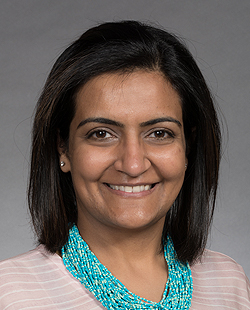Personal Statement
I am the Psychiatry Chief of Service for both campuses of the University of Washington Medical Center. I also direct our Psychiatric Consultation and Telepsychiatry Program. My clinical focus is on patients who are hospitalized with simultaneous psychiatric and medical issues. Academically, I most often teach psychiatry trainees about psychopharmacology for refractory mood, anxiety, and psychotic disorders.

Personal Statement
I am a board certified psychiatrist and work at Fred Hutchinson Cancer Center. I am a Clinical Assistant Professor of Psychiatry and Behavioral Sciences at the University of Washington. I obtained a fellowship in consultation-liaison psychiatry, a specialty that focuses on providing psychiatric care for people with complex medical conditions. My primary clinical focus is people with cancer.
I love my work. Being ill is a vulnerable time and my goal is to ease suffering and provide a sense of connection and understanding for all I work with. I believe in working collaboratively with patients and families. We work together to identify what the goals of treatment are. I have expertise in diagnosis, psychopharmacology and psychotherapy and adapt my recommendations to best serve the goals of the person before me.
I am also passionate about education. I am the site director at Fred Hutch Cancer Center for our Psycho-oncology Fellowship Program. I supervise Cl fellows, addiction fellows, psychiatry residents and provide education to social workers and psychology trainees.
Personal Statement
I work in the Psychiatric Intensive Care Unit where we care for the most psychiatrically and medically compromised patients in the region.
Personal Statement
I am a consultation-liaison psychiatrist and health services researcher in the Department of Psychiatry and Behavioral Sciences and Adjunct Professor in the Departments of Rehabilitation Medicine and Epidemiology. I am also Medical Director of the Department of Psychosocial Oncology at Fred Hutchinson Cancer Center.
My research interests are in psychiatric epidemiology, health services research, psychiatric oncology, and neuropsychiatry. In my clinical practice, I use a comprehensive, multifaceted approach that may include medications or counseling to help patients achieve their goals. My primary interest is helping people who are coping with medical illness. I am particularly interested in developing better approaches to delivering person-centered psychiatric care to these populations.
Personal Statement
I completed my undergraduate, medical school, and residency training at the University of Washington in Seattle. I am board certified in family medicine and psychiatry with subspecialty training in addiction medicine. My clinical interests include inpatient and outpatient psychiatric consultation to primary care providers, mood disorders in pregnant and postpartum mothers, and clinical service in underserved communities.

Personal Statement
I am a Clinical Assistant Professor in the Department of Psychiatry and Behavioral Sciences at the University of Washington. I received my MD from New York University and completed my adult residency at the Harvard Massachusetts General Hospital/McLean Hospital program where I was chief resident. I then went on to complete a fellowship in psychosomatic medicine at the University of Washington. I am currently on faculty at Harborview Medical Center on the inpatient psychiatry consult service.
I have a longstanding interest in the intersection between medicine and psychiatry, and am the author of numerous published articles on topics ranging from the neuropsychiatric effects of steroids to managing borderline personality disorder in the primary care setting. I have a particular interest in the use of electroconvulsive therapy, including in the treatment of catatonia. I am currently involved in research projects in conjunction with the division of nephrology and the neurosurgery department. In addition to my clinical and research interests, I am also an associate program director for the UW Adult Psychiatry Residency at Harborview Medical Center.

Personal Statement
I am a child and adolescent psychiatrist with experience in delivering guideline-based care for child and adolescent psychiatric disorders. I am the Medical Director of the Outpatient Psychiatry Clinics at Seattle Children’s, and have experience with training of staff to deliver guideline-based care. I also have health services training, including having obtained a Master of Public Health (MPH) in Health Services and participation in a Primary Care-Psychiatry Research Fellowship funded by the National Institutes of Health.
My clinical work includes treatment of outpatients and inpatients with a variety of mental health needs, and I provide telepsychiatry in our outpatient clinics. I have experience with collaboration with primary care providers to deliver care to pediatric patients, including serving as a consulting psychiatrist on the Partnership Access Line, which provides psychiatric consultation regarding mental health assessment and treatment to pediatricians and other primary care physicians throughout the state of Washington. I have expertise in the treatment of common mental health problems in a pediatric population.
My research has focused on mental health care for common psychiatric illnesses including depression and ADHD, and has included utilization of collaborative models of care and testing of interventions for youth with psychiatric diagnoses. I have been a co-investigator, with R01 PI Kathleen Myers, MD, for a study of guideline-based care provided by telepsychiatry for youth in rural communities with a diagnosis of Attention Deficit Hyperactivity Disorder.
Personal Statement
My clinical interests are delirium, women’s mental health and behavioral heath integration in primary care settings.
Personal Statement
I completed my Residency in Psychiatry with the UW in 1982 and since then have worked at Harborview Medical Center in the Psychiatry Department. I am a Clinical Associate Professor and provide weekend and on-call coverage for 5MB on the Intensive Psychiatric Unit.
Personal Statement
I work in sleep disorders medicine, Geriatric psychiatry, and with the seriously mentally ill.








